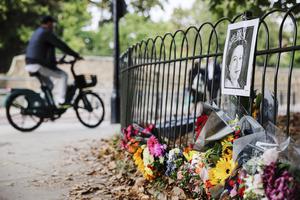A Tribute to My Queen
A kindred mother and grandmother to millions, it seems fitting that she should have passed on the feast of the Nativity of Our Blessed Mother, the Queen of Heaven.

Her Majesty Queen Elizabeth II was the only British monarch the vast majority of my countrymen have ever known.
Most of us grew up with great admiration and filial affection for her — this formidable woman with an untiring sense of duty who was an example to us all. She was our sovereign for 70 years, and with her deep sense of service that emanated from her Christian faith, the Queen brought stability and unity to the whole nation.
One of my earliest childhood memories was of her Silver Jubilee in 1977 and, as with her Platinum Jubilee that providentially she was able to celebrate earlier this year, the Queen was rightly celebrated across the country with street parties, concerts and the obligatory commemorative mugs.
But not every monarch is so feted and revered. What made Queen Elizabeth so special was that she grasped the full spiritual weight and responsibility of her office, and sought to execute it with that in mind. Her steadfast witness of faith in Jesus Christ and her firm hope in his promises — as Pope Francis rightly put it in his tribute to her this evening — was central to all that she was and all that she did. And it made her a pillar of stability in an ever-changing world.
The Queen was fully aware that the British monarchy, whose roots are deeply Catholic, is primarily a spiritual office, requiring that it be set apart from other elements of the nation. For this reason, she largely remained intensely private and almost never gave interviews, allowing a rightful mystique to surround the office that pointed, not so much to her, but to the God she served.
Her sense of duty was known and respected by everyone. Just two days before her death, her last public act was to appoint Liz Truss as the country’s new prime minister — the 15th of her long reign that even included Sir Winston Churchill — and she thereby carried out one of her most important sovereign duties right to the very end.
Her faith also gave her an obvious sense of humanity. She dedicated hours and hours to countless charities, and did so always with a kind and gracious word for those whom she met, along with a keen sense of humor. (In private, she was an excellent mimic, I was once told.)
Queen Elizabeth’s selflessness and consideration for others was also apparent from an early age, as personally witnessed in a small way by my great-grandfather, Sir Gerald Wollaston, at her Coronation in 1953. By that time retired as Garter Principal King of Arms, responsible to the sovereign for ceremonial and heraldry, Sir Gerald assisted the Duke of Norfolk in arranging the Coronation. (As a Catholic, the duke is traditionally put in overall charge of coronations, which remains the most Catholic state ceremony in the land.)
The day of the Queen’s enthronement, June 2, happened to be Sir Gerald’s 79th birthday and despite the magnitude of the occasion and no doubt countless other things the Queen had to recall, she remembered to wish him happy birthday.
But the Queen’s humanity was not spotless. During her reign, successive governments passed legislation clearly contrary to the natural law, such as legalized abortion and same-sex “marriage.” The Queen gave royal assent to each of them — a formality required for all legislation. Even though she might have personally opposed such laws, and in theory could have withheld her assent (it is very rare for the monarch to do so, the last being Queen Anne in 1708), she chose not to.
For her own reasons which may become known in the years to come, it appears at least that she placed the importance of loyalty to the democratic will of the nation above the natural law in these instances. She acted as she thought best, and in accordance with the Anglican and monarchical tradition in which she was steeped.
However much that may have lamentably limited her, she will nevertheless be remembered as an exceptional monarch, truly a “global queen” who gave so much not only to her country and subjects whom she so loved, and who so loved her in return, but to all people of whatever nation and background, driven by her deep Christian faith.
That made Queen Elizabeth II like a mother and grandmother to millions, and so it seems fitting that she should have passed on the feast of the Nativity of Our Blessed Mother, the Queen of Heaven. May she soon be welcomed into the heavenly Kingdom and behold the Face of God.
- Keywords:
- queen elizabeth ii
- united kingdom
- nativity of mary


















